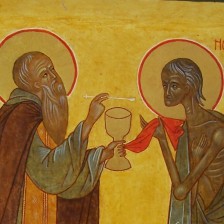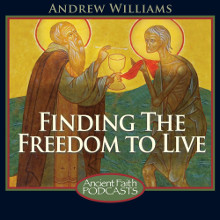 How talking about anything — including violence and sexuality — can lead to consequences in others’ lives, intentionally and unintentionally.
How talking about anything — including violence and sexuality — can lead to consequences in others’ lives, intentionally and unintentionally.
When I was a young student, some Evangelical friends took me to a talk by a well-known Evangelical speaker. The subject was the Resurrection. It was an interesting talk, and I found his presentation convincing in terms of the reality of the Resurrection as it is described in the gospels. However, the question that I did not ask of myself for a while was “what does that mean for me?”
Once something is revealed that was previously hidden, there are consequences — positive and negative, whether we immediately see them or not. Once we start talking about anything, we open up actions in ourselves and others that we might not have predicted.
We can see the negative side of this in many recent events. The so-called “Brexit” referendum in the UK over leaving the EU was followed by a spate of racist attacks in various parts of the country. Somehow, the very fact that immigration was an element of the discussion opened up in some people’s minds the idea that racist thoughts could now be acted upon freely.
Or, sometimes, by revealing our own motives and actions, we can manipulate the perverse thinking of others into perverse action — for example, in the Orlando shooting and the Nice lorry attack, the propaganda by “Daesh” or “ISIS” served as an inspiration and justification for extreme violence, bloodshed and murder by those who were looking for some meaning in their own lives and deaths.
God finds ways of using our very separation and sin to teach us freedom and love Share on X
Going back to the very beginning, we see this played out by Adam and Eve in the garden. The tree of good and evil… the tree of knowledge… Manipulation by the Evil One ensured that the effect of opening up this new knowledge was that we fell into sin and separation from each other and from God. And yet, of course, God continues to work and to find ways of using our very separation and sin as a means of teaching us freedom and love.
For at least the last century or two, our society has been in a gradual process of increasingly opening up public discussion of sex, sexuality, and gender. Although this process has clearly been undertaken with mixed motives, many people view it precisely as opening up human freedom and love. But as with every revealing, it is a double edged sword.
On the one hand, the ability to open up and discuss our deepest feelings, temptations, and desires can indeed be liberating. Not necessarily in the sense (most common today) that by doing so we are freed to act on them without public censure, but also in the sense that opening up the darkest corners of my heart enables light to shine in — the true light, the light of Christ. We do, of course, have confession — a way to begin to open up these dark corners in the presence of a confessor — a confessor who is hopefully loving enough to show us total acceptance in our persons of what we are and also discerning enough to help us see what in us does not reflect the image of God and through this help us to move towards acquiring a greater likeness of God.
But I think for many of us, we find that this relatively closed and protected environment does not seem to be enough. In the early church, of course, such confessions were often made in front of the congregation. And as we read in the Ladder, St John Climacus describes an example of this even in his time, when a novice was encouraged to give his confession before the whole assembly of the brotherhood for the edification of all.
We may find that, particularly in the case of sexual temptations and sins, particularly where we feel condemned by a very public, very strong aversion to those very feelings and experiences which we hold within ourselves… we have a very great sense of shame — and not healthy shame, but a toxic shame that closes us in upon ourselves and prevents us from finding a way to that very vulnerability that is necessary to develop deep, loving relationships. And so we feel very strongly that we do not want to continue to sweep this under the carpet… we feel, in the modern way of speaking, that we want to “come out of the closet”. We feel the need to reveal things about ourselves that will both humble and yet free us in the eyes of our brethren, and that will provide the opportunity for true vulnerability on both sides — as we are exposed in front of our fellows, and as they have to find a way to deal with that revelation — true vulnerability that can lead to a deeper, more real relationship of love.
However, revelation has its consequences, and in this fallen world, these consequences are likely to be not only positive but also negative. So as we lay out more and more of these kinds of issues openly in the public square, we inspire the thoughts and feelings of others. Those inchoate longings which we sense inside but have found no way to express may start to hang themselves on the thoughts and desires of others. We learn to categorize our feelings and even ourselves according to what we learn from others.
The revelation of one man’s desire can become a new temptation for many Share on XThere is very strong evidence of this exact thing happening in pornography. On the one hand, pornography reflects the desires and fetishes of porn users. But on the other hand, it also forms them. Visitors to porn sites will immediately be confronted with suggestions of desires and fetishes they had never thought of before, and habitual users of porn — experiencing the need for intensification common to all addicts — will stray into more and more specific and peculiar, and often violently abusive, fantasy worlds. As porn sites continue to build data on the patterns of users, they continue to get ever cleverer in suggesting the next new fetish to each viewer. Thus the revelation of one man’s desire becomes a new temptation for thousands, if not millions more.
This same pattern is also visible in the changing face of sexual relationships. Without being specific here, it is undeniably true that sexual practices have changed quite dramatically over the last few decades, and practices that were previously very rare have become commonplace. The revelation of one man’s desire becomes a temptation for many.
It is a controversial question whether the dangers outweigh the rewards in this new openness. But it is certain that with every revelation comes a great responsibility, and it is not a responsibility that our society currently even recognizes, let alone takes seriously. We need to learn that more knowledge about things is not in itself a good… it all depends on how we use it. There again, we cannot sweep everything back under the carpet, and so we have to learn how best to deal with what has been revealed to us.
Going back to my student experience, knowing about the resurrection gave me new responsibilities that took a long time, serious reflection, and the mystical action of the Holy Spirit to recognize. I came to see that if Christ rose from the dead, if Christ is still alive, then I am faced in the end with a simple choice in every moment: I have to learn to know him better and to love him, or I have to deliberately turn my back on him, try to ignore him, and go my own way in blindness to his truth.
Our challenge: to love and accept each person -and- shine Christ's light into every dark place. Share on X
We are faced with the same choice with every person we relate to every day, and with every personal revelation that is laid before us. We are all faced with that part of the responsibility of the confessor now: how do we both love and accept the person as he or she is and yet exercise discernment and help to shine the light of Christ into every dark place.


You must be logged in to post a comment.